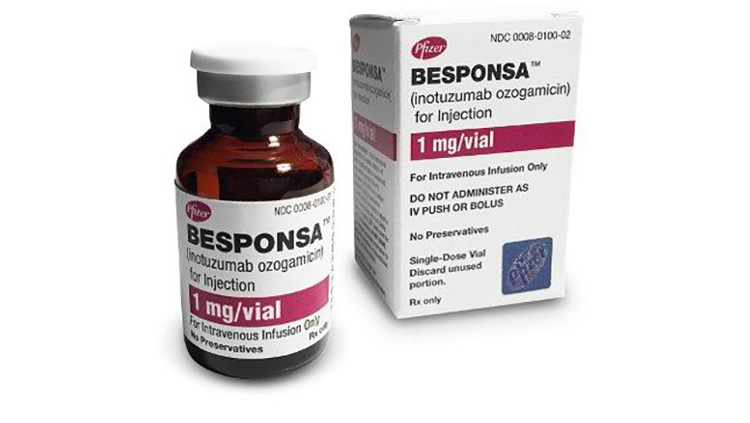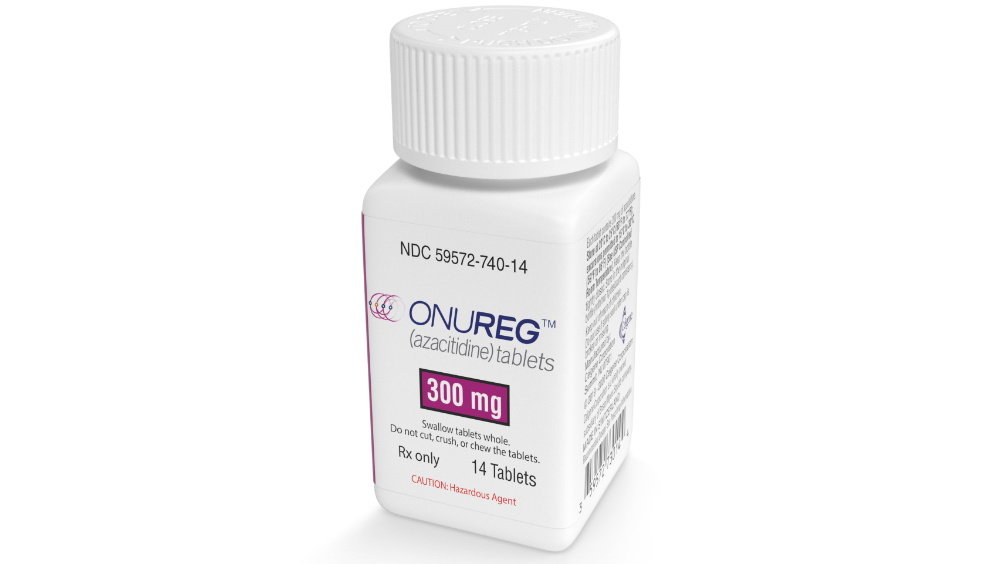Besponsa (inotuzumab ozogamicin) vs Onureg (azacitidine)
Besponsa (inotuzumab ozogamicin) vs Onureg (azacitidine)
Besponsa (inotuzumab ozogamicin) is an antibody-drug conjugate specifically indicated for the treatment of adults with relapsed or refractory B-cell precursor acute lymphoblastic leukemia (ALL), targeting the CD22 antigen on B cells. Onureg (azacitidine) is a hypomethylating agent used for the continued treatment of patients with acute myeloid leukemia (AML) who are in the first remission after chemotherapy and are not able to complete intensive curative therapy. The choice between Besponsa and Onureg would depend on the specific type of leukemia a patient has, as well as their overall treatment plan, tolerance for specific therapies, and the stage of their disease.
Difference between Besponsa and Onureg
| Metric | Besponsa (inotuzumab ozogamicin) | Onureg (azacitidine) |
|---|---|---|
| Generic name | Inotuzumab ozogamicin | Azacitidine |
| Indications | Acute lymphoblastic leukemia (ALL) | Acute myeloid leukemia (AML) |
| Mechanism of action | Antibody-drug conjugate targeting CD22 | Cytidine nucleoside analog; hypomethylation of DNA |
| Brand names | Besponsa | Onureg |
| Administrative route | Intravenous | Oral |
| Side effects | Thrombocytopenia, neutropenia, infection, anemia, fatigue | Nausea, vomiting, diarrhea, constipation, fatigue |
| Contraindications | Hypersensitivity to active substance or excipients | Advanced malignant hepatic tumors, hypersensitivity to azacitidine or mannitol |
| Drug class | Antineoplastic agent | Hypomethylating agent |
| Manufacturer | Pfizer | Bristol Myers Squibb |
Efficacy
Besponsa (Inotuzumab Ozogamicin) Efficacy in Leukemia
Besponsa (inotuzumab ozogamicin) is a targeted therapy used in the treatment of adults with relapsed or refractory B-cell precursor acute lymphoblastic leukemia (ALL). This monoclonal antibody drug conjugate specifically targets the CD22 antigen expressed on the surface of B cells. Once bound to CD22, the drug is internalized by the cell, releasing a cytotoxic agent that induces cell death. Clinical trials have demonstrated the efficacy of Besponsa in inducing complete remission in a significant proportion of patients. These studies have shown that patients treated with Besponsa have higher remission rates and longer progression-free survival compared to those who received standard therapy.
The INO-VATE ALL trial, a key study that led to the approval of Besponsa, compared the drug to standard chemotherapy. The results indicated that a greater number of patients achieved complete remission with Besponsa than with chemotherapy. Additionally, the median duration of remission was notably longer for patients treated with Besponsa, highlighting its efficacy in this patient population. However, it is important to note that while Besponsa can be effective, it is not curative and is associated with a risk of severe side effects, which must be balanced against its potential benefits.
Onureg (Azacitidine) Efficacy in Leukemia
Onureg (azacitidine) is an oral hypomethylating agent approved for the continued treatment of adult patients with acute myeloid leukemia (AML) who achieved first complete remission (CR) or complete remission with incomplete blood count recovery (CRi) following intensive induction chemotherapy and are not able to complete intensive curative therapy. Azacitidine works by inhibiting DNA methyltransferases, leading to the reactivation of silenced genes that can suppress tumor growth. The efficacy of Onureg in AML was demonstrated in the QUAZAR AML-001 clinical trial, which showed a statistically significant improvement in overall survival for patients taking Onureg as maintenance therapy compared to those who received a placebo.
The QUAZAR AML-001 trial highlighted that patients treated with Onureg had a median overall survival of 24.7 months, compared to 14.8 months for patients on the placebo. Furthermore, the study also showed a delay in relapse for patients treated with azacitidine, suggesting a potential benefit in maintaining remission and extending survival. These results indicate that Onureg can be an important treatment option for AML patients who are in remission but are not candidates for intensive curative therapies, such as stem cell transplantation.
Regulatory Agency Approvals
Besponsa
-
European Medical Agency (EMA), European Union

-
Food and Drug Administration (FDA), USA

Onureg
-
European Medical Agency (EMA), European Union

-
Food and Drug Administration (FDA), USA

Access Besponsa or Onureg today
If Besponsa or Onureg are not approved or available in your country (e.g. due to supply issues), you can access them via Everyone.org.
How it works

Make an enquiry
Choose the medicine you want to buy, answer a couple of questions, and upload your prescription to speed things up. We’ll get back to you within 24 hours.


Make an enquiry
Choose the medicine you want to buy, answer a couple of questions, and upload your prescription to speed things up. We’ll get back to you within 24 hours.


Breeze through the paperwork
We'll guide you through the required documents for importing unapproved medicine, ensuring you have all the necessary information.


Get a personalized quote
We’ll prepare a quote for you, including medicine costs and any shipping, administrative, or import fees that may apply.


Receive your medicine
Accept the quote and we’ll handle the rest - sourcing and safely delivering your medicine.

Some text on this page has been automatically generated. Speak to your physician before you start a new treatment or medication.
Let's talk
If you have any questions, call us or send us a message through WhatsApp or email:
Contact us




